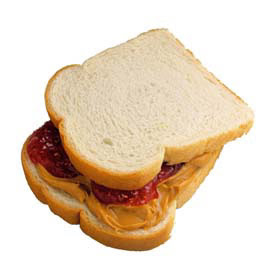Eating plant-based meals conserves natural resources and slows global warming Looking for small ways to make a big difference for the environment? Why not start by making yourself a peanut butter and jelly sandwich?

As members of the
PB&J Campaign (no, I’m not kidding) like to say, “You don’t have to change your whole diet to change the world. Just start with lunch.”
Eating a plant-based lunch (such as a peanut butter and jelly sandwich, a bean burrito, vegetarian chili, or a hearty salad) instead of an animal-based lunch (such as a hamburger, a tuna or grilled cheese sandwich, fish and chips, or chicken nuggets) will save water, preserve land and slow
global warming.
How Eating a PB&J Sandwich Slows Global WarmingEvery time you eat a peanut butter and jelly sandwich or other plant-based meal instead of an animal-based lunch, such as a hamburger, you save the equivalent of almost 3.5 pounds of
greenhouse gas emissions, including 2.5 pounds of carbon dioxide. That’s about 40 percent of the carbon you would save by driving a
hybrid vehicle for the day instead of a standard sedan.
How Eating a PB&J Sandwich Saves WaterGrowing plants for food takes a lot less water than raising animals. As a result, every time you substitute a peanut butter and jelly sandwich or some other plant-based meal for an animal-based meal such as a hamburger, you save about 280 gallons of water. Eat three PB&J sandwiches a month instead of animal-based meals and you can save as much water as you would by switching to a low-flow showerhead.
How Eating a PB&J Sandwich Saves LandRaising animals for food takes a lot of space. For example, animal products require 6 to 17 times as much land as soy to produce the same amount of protein. Eating a plant-based lunch like a peanut butter and jelly sandwich instead of a hamburger, ham sandwich, or another animal-based meal saves anywhere from 12 to 50 square feet of land from
deforestation, overgrazing, and pesticide and fertilizer pollution.
How Eating One PB&J Sandwich Helps the EnvironmentBy eating lower on the food chain—plants instead of animals—you also consume fewer resources. Why? Because, basically, everything you eat comes from plants. You either eat plants directly—in the form of fruits, vegetables and plant products such as peanut butter—or indirectly after animals have converted plants into meat, milk, eggs, butter and cheese.
The problem is that animals are not very efficient as living food factories that convert plants into food for humans. Animals use most of the plants they eat to produce the energy they need to walk around and keep breathing. To stay alive long enough to become part of your lunch or dinner menu, every cow, pig and chicken has to eat much more protein, carbohydrates and other nutrients than it will yield once the ax finally falls. As a result, it takes several pounds of plants to produce one pound of beef, pork, chicken, eggs or milk.
Inevitably, that means it also takes a lot more land, water and fuel to produce one pound of meat, milk or eggs than it does to produce one pound of edible plants. Not only do the animals need food, water and room to roam, but growing the plants to feed the animals that will, in turn, become food for you requires even more land and water as well as fuel for farm machinery and irrigation pumps.
To help provide some context, the PB&J Campaign says the water required to produce the beef in one hamburger could grow enough peanuts for 17 peanut butter and jelly sandwiches. And the land required to put that same beef patty on your bun could produce enough peanuts for 19 PB&J lunches.
How You and Your Diet Can Make a Difference
Basically, this all comes down to your power as a consumer. Every time you choose a hamburger, omelet or grilled cheese sandwich over a plant-based meal, you’re telling your local restaurants and supermarkets to buy more meat, eggs and dairy products. By choosing more plant-based meals, you’re asking for less meat and a more efficient use of resources. Either way, your unspoken but unmistakable messages are received by your local merchants and conveyed to wholesalers and farmers.
Want to do more? Share this information with your friends, coworkers and family members and urge them to take action. Urge your school or office cafeteria, or the local restaurants you frequent, to offer more plant-based dishes. Organize a weekly PB&J lunch (or other plant-based meals) at work, home or school and calculate the positive environmental contribution you’ve made.
From About.com: Can PB&J Save the World?
http://environment.about.com/od/greenlivinginthekitchen/a/peanut_butter.htm





